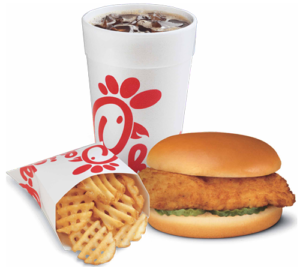When a Business You Disagree With Comes To Town
 At one of the many Christmas parties I went to during the holidays, I met up with a good friend of mine named Stella. In her day job, she works as a full-time nurse, but during after hours, she is a full-time social justice warrior. I get an email from her at least once a week about whatever progressive, anti-Trump protest, rally, cause or petition she wants me to support.
At one of the many Christmas parties I went to during the holidays, I met up with a good friend of mine named Stella. In her day job, she works as a full-time nurse, but during after hours, she is a full-time social justice warrior. I get an email from her at least once a week about whatever progressive, anti-Trump protest, rally, cause or petition she wants me to support.
While dining at the party, Stella told me about her latest crusade; taking down Chick-fil-a. It was announced recently that the fast food franchise would be opening its first store within Boston city limits this year. There has been pushback by many progressives, including our late Mayor Menino, for many years to keep out businesses that don’t align with the city’s liberal values. Chick-fil-a founder, the late S. Truett Cathy, and his family run their business based on their Christian values, which includes being closed on Sundays to celebrate the Sabbath. However, the main objection to the restaurant coming to Boston has been the fact that Chick-fil-a donates money towards anti-LGBT causes.
Stella, who is openly bisexual, said that she will not only not eat at this new Chick-fil-a, but will also just support businesses that support a pro-LGBT agenda going forward. She wanted me and others at the party to take that pledge to do that as well.
I consider myself to be a progressive myself. While I support full rights for LGBT people, I am also a capitalist. I was never really a fan of this effort to “ban” certain businesses from coming to the city because of different beliefs on social issues. As a small business owner, I believe in letting the free marketplace decide on the fate of a business. If enough people decide they don’t want to support a business for whatever reason, whether it be because of the owner’s personal beliefs or simply because the company’s products or services are poor, then that business will cease to exist. That’s how capitalism works.
I am also a realist. I think it is admirable to say that you will not do business with companies based on personal beliefs; however, it is not realistic to a certain extent. Sure, there are lists that exist showing businesses that support “XYZ” causes that you can find online. But in reality, if you tried to only support businesses that support all your personal beliefs and politics, you would not have many places to shop or eat at. You more than likely interact with people at businesses every day who have a wide variety of belief systems that you would be shocked by if you knew ahead of time. Do you know what the cashier at your local supermarket thinks about abortion? How about the bartender at that restaurant you like to eat at? What does your dry cleaner really think about black people? Does your plumber have a bias against people with disabilities having rights? The only difference here is that Chick-fil-a publicly advertising its opinions. It is not against the law to have certain opinions and beliefs. Same-sex marriage has been legal in the United States for a couple of years now, but that doesn’t mean everyone in the country supports it. Heck, abortion has been legal for 45 years, and there are still many people against it, including business owners.
With that said, this would be a different conversation if there was evidence Chick-fil-a was discriminating against LGBT people in employment. When personal belief is used to go against the law, that is where the line is drawn. There is still no federal law barring companies from discriminating against LGBT workers; however, there are a few states, including Massachusetts, that do protect against LGBT employment discrimination. But employment discrimination at Chick-fil-a doesn’t seem to be the case here. Wal-Mart has also been “banned” from Boston for its many documented poor labor practices. However, the failed push to bring the second headquarters for Amazon, which has similar labor issues, to Boston might signal a change in the city’s attitude about accepting these companies.
In the meantime, I do enjoy a Chick-fil-a sandwich every once in a while at the nearest restaurant to Boston, not because I support the company’s anti-gay stances, but because it is simply a good sandwich.